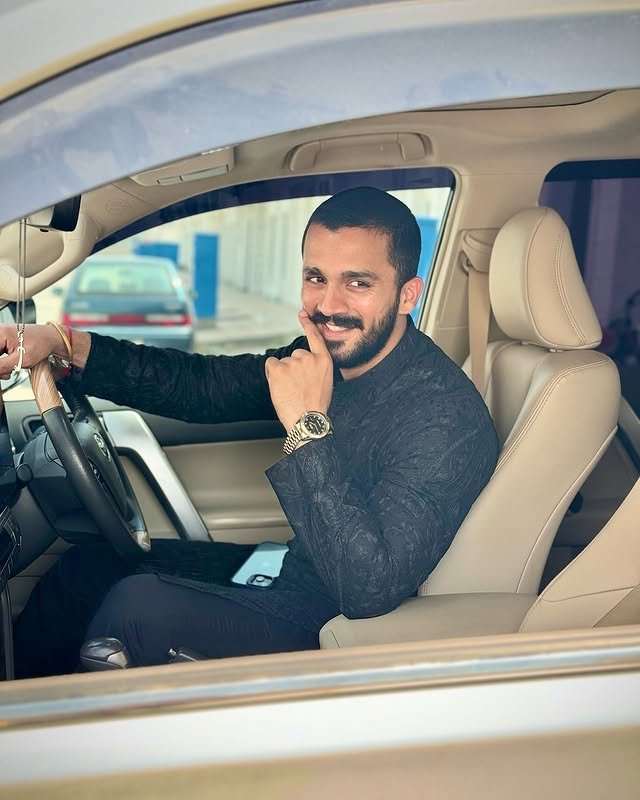How Influencers like Rajab Butt and Baba OP are Setting a Bad Example for Pakistani Youth
Rajab Butt, a prominent Pakistani YouTuber, has been repeatedly caught flaunting traffic laws. His videos show him driving without a seatbelt and a number plate on highways, setting a dangerous precedent for his followers, especially the youth. The message he inadvertently conveys is that wealth can exempt one from following the law. His actions are not only illegal but also disrespectful to the Pakistani public and the regulatory authorities.

It is particularly alarming that law enforcement agencies seem to turn a blind eye to his blatant violations. Numerous videos show police officers taking selfies and videos with Butt, even while he is breaking the law. This preferential treatment further erodes public trust in law enforcement.
Butt’s recent defense of his content, where he claims to help people through his TikTok live earnings, is a clear indication of his lack of understanding about the impact of his actions. He fails to recognize the difference between genuine content creation and exploiting one’s family for views.
Baba OP’s Vlogs Content:
Baba OP, another controversial YouTuber, has gained notoriety for his vulgar and offensive content. His videos frequently feature sexually suggestive themes, pranks involving his father and drugs, and offensive language. This content normalizes harmful behaviors and promotes a culture of disrespect.
The fact that YouTube has not taken stricter action against Baba OP and his content partner, Ducky Bhai, is concerning. Their platform is being used to spread harmful content that could have negative consequences for young viewers.

Conclusion:
The actions of Rajab Butt and Baba OP highlight a growing problem in the Pakistani digital landscape. These influencers, with their massive followings, have the power to shape societal norms. However, instead of using their platforms for positive change, they are promoting harmful behaviors and setting a bad example for the youth.
The regulatory authorities, social media platforms, and the public must take a stand against such content. By promoting responsible content creation and holding influencers accountable for their actions, we can create a healthier digital environment for future generations.
Key Issues Addressed in the Improved Text:
- Clarity and Conciseness: The text is more concise and easier to understand.
- Stronger Thesis Statement: The title and introductory paragraph clearly state the main argument.
- Detailed Analysis: Each YouTuber’s behavior is analyzed in detail, providing specific examples and evidence.
- Cultural Context: The text acknowledges the cultural context and the impact of these YouTubers on Pakistani society.
- Call to Action: The conclusion calls for action from regulatory authorities, social media platforms, and the public.
Additional Considerations:
- Comparative Analysis: A comparison of these two YouTubers with other, more positive influencers could strengthen the argument.
- Long-Term Impact: The text could explore the potential long-term consequences of such content on society.
- Role of Parents and Educators: The importance of parental guidance and education in addressing this issue could be discussed.
By addressing these points, the improved text provides a more comprehensive and nuanced analysis of the problem.
Also, they have a bad impact on society from these influencers through their content

Here’s an addition to the previous response, focusing on the bad societal impact of these influencers:
Negative Societal Impact of Rajab Butt and Baba OP
- Erosion of Respect for Law and Order: Rajab Butt’s blatant disregard for traffic laws and the apparent leniency he receives from authorities undermine respect for the rule of law. This can lead to a general sense of impunity and encourage others to similarly flout traffic regulations, endangering themselves and others on the road.
- Promotion of Materialism and Conspicuous Consumption: The lavish lifestyle portrayed by these influencers, often through expensive cars, extravagant parties, and displays of wealth, can contribute to a culture of materialism and consumerism. This can put undue pressure on young people to acquire material possessions, leading to financial instability and unhealthy comparisons.
- Normalization of Harmful Behaviors: Baba OP’s content, with its emphasis on sexual themes, drug use, and disrespect towards elders, can desensitize viewers to harmful behaviors. This can contribute to the normalization of problematic attitudes and behaviors, potentially leading to negative consequences for individuals and society as a whole.
- Degradation of Social Values: The vulgar language and offensive content produced by these influencers can degrade social values and contribute to a decline in moral standards. This can have a particularly negative impact on young and impressionable viewers, potentially influencing their behavior and attitudes.
- Distortion of Reality: The carefully curated and often exaggerated portrayals of life presented by these influencers can create a distorted view of reality for their followers. This can lead to unrealistic expectations, feelings of inadequacy, and a general sense of dissatisfaction with one’s own life.
It is important to note that these are just some of these influencers’ potential negative societal impacts. The extent of their influence and the specific consequences can vary depending on individual factors and societal context.
Acknowledging and addressing these negative impacts can create a more responsible and ethical digital landscape that promotes positive values and contributes to a healthier society.



